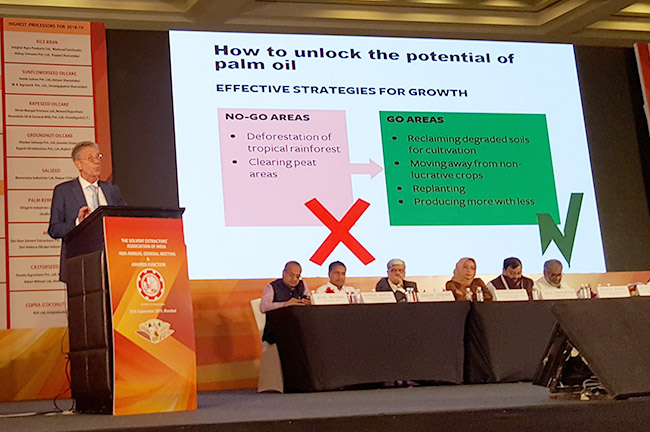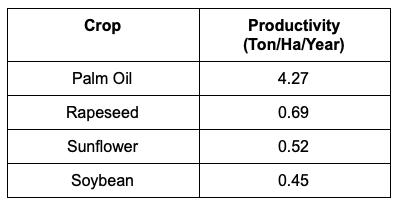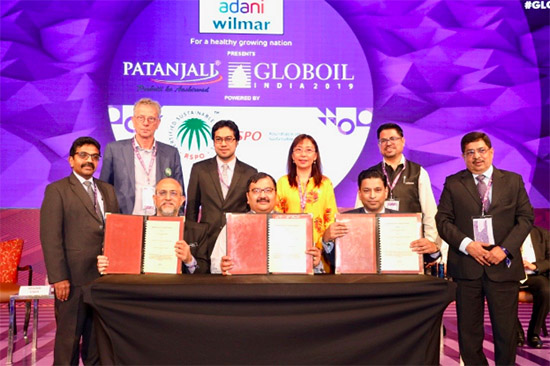 Nico Roozen speaking about unlocking the potential of palm oil at this year's Globoil conference in India
Nico Roozen speaking about unlocking the potential of palm oil at this year's Globoil conference in India
During my recent visit to India to join the annual Globoil conference, I met with high level delegations from Indonesia, Malaysia and India, led by the respective ministers. Together we visited farmers and grassroots organizations deeply rooted in the palm oil sector – these visits triggered me to review my understanding of realities. Being a good listener, Solidaridad could take steps to bring our local partnerships to the next level.
Time for disruptive thinking: palm oil as avoided deforestation
Imagine a world where the need for affordable vegetable oil was covered by rapeseed, soybean or sunflower oil from the moderate climate zones. Or by another less productive vegetable oil variety, like the palm tree from the tropics.
These low productivity crops would have created an ecological disaster of an unimaginable size.
Productivity data reveal that oil palm is the most efficient crop in converting solar energy into vegetable oil. In fact, it is 8-10 times more productive per hectare of land than other vegetable oils. With less land, palm oil producers can produce significantly more than their competitors.
 Source: Oil World (2008) Oil World Statistic ISTA Mielke GmBh Hamburg
Source: Oil World (2008) Oil World Statistic ISTA Mielke GmBh Hamburg
For sure, palm oil production has damaged forest landscapes. But at the same time, it has saved many forest areas. For alternative crops the land seizure would have been much bigger, and the loss of biodiversity and forests much greater.
A proud farmer told me "palm oil has saved the world from an ecological disaster." I immediately understood that there was some truth in his disruptive thinking.
Farmers’ wisdom can help you to demystify the rhetoric of dark green campaigners and dominant thinking, which sees palm oil as the main driver of deforestation.
Time for building stronger partnerships: national frameworks in the lead
 Signing of the Memorandum of Understanding
Signing of the Memorandum of UnderstandingThese national frameworks have the potential to bring speed and scale to the transformation process for a more sustainable palm oil economy by raising the floor, instead of raising the bar.
Time to overcome polarization: the EU ban has done a lot of damage
Campaigns blocking palm oil cargo from arriving in European harbours and pressurizing the EU institutions to ban palm oil for biofuels have done a lot of damage to the reputation of the crop, and the relations between Europe and Asia. In my opinion, East-West polarization will not bring any solutions, nor joined efforts.
In reality the EU resolution to ban palm oil for biodiesel by 2030 is an example of the greenwashing of politics. Market realities are more important to understand the real world. The market reality is that Europe has set ambitious targets for the electrification of traffic.
2020 will be the year that a broad spectrum of electric cars is introduced; moving electrification from niche to mainstream. This process will phase out gasoline and diesel engines and, consequently, biodiesel.
In other words, the EU ban on palm oil by 2030 is not relevant and for this reason there was majority support; biodiesel will be phased out in any case.
Electrification is the winning game and for good reasons; cleaner cities and lower carbon emissions. So I advised our Asian partners not to play the losing game, linking palm oil to the old economy for fossil fuels. Palm oil is a plant-based product. For this reason it clearly deserves a place in the new economy, moving to plant-based food and showing growth in luxury products like shampoos and cosmetics. When you are in the wrong corner, you will suffer, and changing the narrative will be costly.
Some voices advocate a 'trade war' to avenge the ban on palm oil. Cancelling an Airbus order in favor of Boeing airplanes, for example. In my view, trade wars are counterproductive. We already see too much of this. Renewed respect and collaboration are a better route. Ministers of Indonesia heard my advice – perhaps they will listen.
